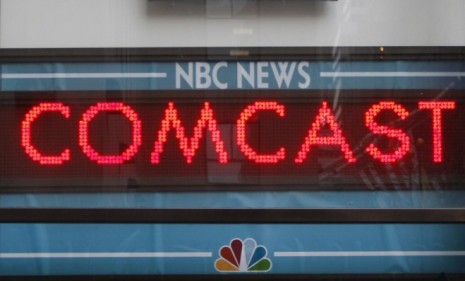The Comcast-NBC deal: Winners and losers
The FCC has approved a controversial merger between the cable provider and the broadcast network. Who stands to gain — and suffer — the most from the deal?

A free daily email with the biggest news stories of the day – and the best features from TheWeek.com
You are now subscribed
Your newsletter sign-up was successful
Federal regulators have given the thumbs up to Comcast's $30 billion merger with NBC Universal, allowing a cable company to buy a major network for the first time. (Watch an NBC report about the merger.) The Federal Communications Commission gave its blessing to the deal on Tuesday, but imposed a swath of temporary conditions to ensure the new company's vast reach does not harm consumers. Here, a look at the winners and losers from the merger:
WINNERS
Hulu
The Week
Escape your echo chamber. Get the facts behind the news, plus analysis from multiple perspectives.

Sign up for The Week's Free Newsletters
From our morning news briefing to a weekly Good News Newsletter, get the best of The Week delivered directly to your inbox.
From our morning news briefing to a weekly Good News Newsletter, get the best of The Week delivered directly to your inbox.
Although many feared that the future of Hulu, the online video streaming service partly owned by NBC Universal, would be threatened by the merger, says Lacey Rose at Forbes, the government stepped in to help preserve it. Having bought NBC Universal, Comcast could theoretically have tried to shut Hulu down as a "threat to the traditional cable business." But the Justice Department has taken away Comcast's right to vote on the site's future.
Bloomberg TV
The FCC's conditions for the Comcast-NBC merger give additional protections to the Bloomberg Television business news network, reports Georg Szalai at the Hollywood Reporter. Under the terms of the deal, Comcast must offer consumers unaffiliated business news networks alongside its own such channel, CNBC. That's good news for Bloomberg, which had "lobbied hard for the condition for the better part of a year," says Brian Stelter at The New York Times.
Online video
A free daily email with the biggest news stories of the day – and the best features from TheWeek.com
As part of the deal, the FCC gave protections to what chairman Julius Genachowski called the "emerging online-video marketplace." If any of Comcast's rivals — such as Disney, Viacom, or Time Warner — cuts a deal with an online streaming video service, Comcast must match that deal. This, says The Economist, effectively guarantees online video sites easy access to "the combined content of Comcast and NBC Universal."
Impoverished and rural households
Another condition of the FCC approval will force Comcast to make high-speed broadband subscriptions available to 2.5 million poor households for $10 a month or less. The cable giant must also expand its broadband networks to 400,000 new homes in rural areas, reports Matthew Lasar at Ars Technica.
Comcast
Although these government conditions might seem to have "tightly constrained what this new company can do," says Rob Pegoraro at The Washington Post, Comcast itself thinks the government terms are "fair" and not too restrictive. "Don't forget all these conditions expire in seven years," and "some vanish in three." The "bigger and scarier unknown" than federal regulations will be how the merger will fare in years to come. You only have to look at "the disastrous AOL-Time Warner marriage" to see how such fusions can fail.
LOSERS
Consumers
Critics say that the deal will restrict diversity of news and entertainment for television viewers. "In historical terms, the concentration of media power in fewer and fewer hands... almost never results in greater choice for consumers," says Kevin Bloom at the Daily Market. And it will cost subscribers more too, says Senator Al Franken (D-Minn.). The deal will mean "higher cable and internet bills... and less freedom of choice for all American consumers."
The open internet
Even though the FCC's approval requires Comcast to adhere to its net neutrality rules, the merger is a disaster for believers in a free and equitable internet, says FCC commissioner Michael Copps, the only member of the five-man commission to vote against the deal. It "opens the door to the cable-ization of the open internet." Web users will now see more "walled gardens, tollbooths, [and] access fees," while Comcast will have free rein to put a "stake in the heart of independent content production."
The TV industry
"This is potentially bad news for the television business," says The Economist. The FCC's protection of online-video outfits will only make them more competitive, and therefore more likely to "take money away from media firms." It could be disastrous for TV companies if consumers start choosing online TV over "cable or satellite subscriptions." This deal has made that "a little more likely."
ESPN
The Comcast-NBC deal will create a "sports behemoth" that could overturn the dominance of Disney Corp's ESPN network, says Jonathan Berr at AOL's Daily Finance blog. Comcast owns the Golf Channel, Versus, and 14 local networks that "deliver 2,400 sporting events annually to more than 50 million homes." When added to NBC's existing sports coverage, the new conglomerate's reach will rival, if not beat that of ESPN.